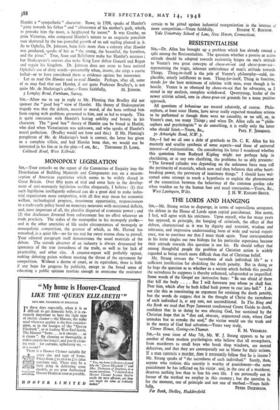MONOPOLY LEGISLATION
Snt,—Your remarks on the report of the Committee of Enquiry into the Distribution of Building Materials and Components rest on a miscon- ception of American experience which seems to be widely shared in Great Britain. Over fifty years of trial and error here in the develop- ment of anti-monopoly legislation testifies eloquently, I believe: (1) that such legislation intelligently enforced can do a great deal to make indus- trial organisation more competitive, with all that may mean for economic welfare, technological progress, investment opportunity, responsiveness to a trade-cycle policy based on monetary measures with occasional deficits, and, most important of all, the pluralist dispersal of economic power ; and (2) that disclosure divorced from enforcement has no effect whatever on trade practices. The stakes of the monopolist in his monopoly profits— and in the other amenities of life under circumstances of monopoly or monopolistic competition, the greatest of which, as Mr. Harrod has remarked, is a quiet life—are far too real for sweet reason alone to prevail. Your editorial paragraph itself demonstrates the usual materials of the debate. The outside observer of an industry is always denounced for ignorance of the true inwardness of the trade, as well as for lack of practicality, and other sins. A counter-report will probably appear, making debating points without meeting the thrust of the agreement for competition. Without a decree of court, or its equivalent, there is little if any hope for progress by publicity, except in the broad sense of educating a public opinion resolute enough to overcome the resistance certain to be pitted against industrial reorganisation in the interest of






























 Previous page
Previous page